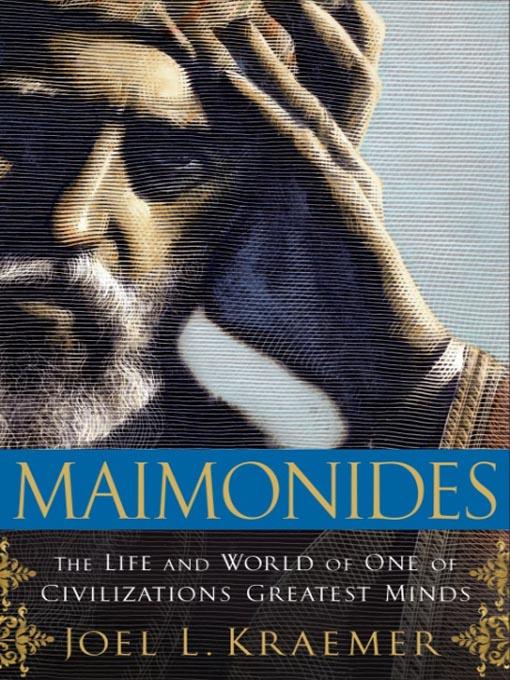
Maimonides
The Life and World of One of Civilization's Greatest Minds
کتاب های مرتبط
- اطلاعات
- نقد و بررسی
- دیدگاه کاربران
نقد و بررسی

September 15, 2008
In 1947, when he was 14, Kraemer started to study Maimonides. Now, the 75-year-old professor emeritus at the University of Chicago has produced his magnum opus, a definitive biography of medieval Judaism’s chief intellectual sage. To prepare himself, Kraemer mastered many languages, traveled throughout the world and studied innumerable documents, including those found in the Genizah, the storeroom of Cairo’s Ben Ezra synagogue. The impressive results of Kraemer’s diligent research are set forth in this learned book, supported by 90 pages of footnotes. He offers a splendid analysis of Maimonides’s major works: Commentary on the Mishnah
; Mishneh Torah
and Guide to the Perplexed
(which Kraemer calls Guide of the Perplexed.) The erudite presentation includes vital information about the life of Maimonides, tracing his path from his birth in Spain to his move to Morocco, his visit to Palestine and, finally, to his settling in Egypt. Kraemer’s imposing contribution is designed for his fellow scholars. General readers should turn to the more fathomable 2005 biography, Maimonides
by Sherwin B. Nuland, from Nextbook/Schocken’s Jewish Encounters series and just published in paper.

October 1, 2008
Kraemer (Jewish studies, emeritus, Univ. of Chicago; "Humanism in the Renaissance of Islam") has spent 60 years studying the life and work of one of the most significant medieval philosophers, Moses Maimonides; his new book presents the results. There are several biographies of Maimonides, but this one is by far the most comprehensive and well documented. Twelfth-century Spain and northern Africa provide the chronological and geographical context for the life of this philosopher. The region was a crossroads of civilizations and religions during which Jewish, Christian, and Muslim ideas interacted in very intellectually fertile ways as Hellenic philosophy and science filtered into Spain with the help of Arabic scholars. Kraemer discusses the issue of Maimonides's conversion from Judaism to Islam, citing pro and con reports; demonstrating the close interaction at this time between Judaism and Islam. Much of the book focuses on Maimonides's publications of "The Mishneh Torah" and his great work, "The Guide of the Perplexed". The latter book was written in Judaeo-Arabic and intended to help the well-educated scholar of religion make sense of the complex philosophical and religious world of the 12th-century Mediterranean. Trained as a physician (he gave medical care to the Sultan Saladin of Egypt), Maimonides is often also remembered for the great legal advice he gave on many moral issues of his time. Kraemer's book is a welcomed addition to the large literature on this subject and is highly recommended for all libraries.James A. Overbeck, Atlanta, GA
Copyright 2008 Library Journal, LLC Used with permission.

December 1, 2008
Kraemers comprehensive study of the great medieval philosopher and Jewish theologian Moses ben Maimon (Maimonides) shows that Maimonides wisdom arose in no small part from having feet in multiple worlds. Although a product of Andalusia and the Mahgreb, Maimonides set down roots in Egypt; a pious Jew, he successfully navigated corridors of power dominated by Islam. A dedicated writer and scholar, he nevertheless spent asignificant portion of his life immersed in the daily exigencies of medicine, business, government, and law. Perhaps most significant from a philosophical perspective, Maimonides was both an expert on the Talmud and an intellectual heir to Aristotles rationalism. Such multifaceted experiences, shows Kraemer, made Maimonides a gifted synthesizer of ideas, and an exemplar of the richness of twelfth-century Mediterranean culture. Kraemer, too, has a talent for synthesis, distilling Maimonides entire corpus of writing (including copious correspondence) and a small mountain of secondary sources (some apocryphal) into a fluid and accessible narrative. Lucid descriptions of medieval Mediterranean lifeincluding commerce, political intrigue, and the constant interplay between cultureswill be compelling even for readers unfamiliar with Maimonides contributions to philosophy.(Reprinted with permission of Booklist, copyright 2008, American Library Association.)

























دیدگاه کاربران